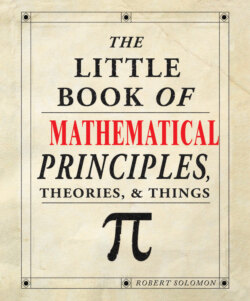Читать книгу The Little Book of Mathematical Principles, Theories & Things - Robert Solomon - Страница 23
На сайте Литреса книга снята с продажи.
4th century BC Greece Plato and Platonism Plato (428–348 BC)
ОглавлениеA philosophy of mathematics that claims that mathematics exists outside the human mind and that it is essential for the education of enlightened people.
_______________
Plato was one of the most important philosophers of all time. His name has even entered our language: a “platonic” friendship is one without any sexual content.
He was also a mathematician and held the discipline of mathematics in very high regard. Above the gate of his academy was written: No one ignorant of geometry can enter here.
Plato’s own achievements in this field were minor – one (disputed) story is that he invented a device with moving rods for the problem of “doubling the cube.” On the other hand, his influence on the philosophy of mathematics was enormous.
In mathematics, Platonism is the theory that mathematical objects – numbers, triangles, and so on – have an existence independent of the human minds that think about them. It is a theory that is very difficult to justify without extra philosophical assumptions. Where do these abstract ideas exist? Is there another universe, completely different from our material universe, which contains abstract objects? Plato seems to have thought so. The essence of his philosophy is that the material world is but an inferior copy of the world of abstract forms.
According to Plato, the work of the mathematician involves discovery rather than invention. Mathematicians investigate the universals which exist independently of mankind, rather than create ideas from their own minds.
The other justification is theological. Abstract ideas exist in the mind of God. Plato said: “In mathematics, men think the same thoughts as gods.”
